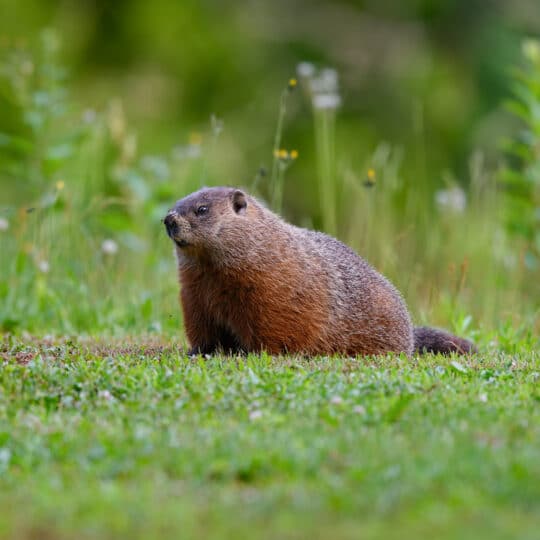6 Methods of Preventing Groundhog Damage in Your Yard
Plus, 4 Reasons Why They’re There

When they’re not predicting the weather, groundhogs may be burrowing through your lawn and garden. There are many factors that could attract a groundhog to your yard. There are also many methods of preventing groundhog damage to help protect your property.
What Attracts Groundhogs
Groundhogs, also known as woodchucks, are recognizable rodents notorious for their ability to wreak havoc on lawns and gardens. These burrowing pests can quickly turn a well-manicured lawn into a maze of holes and tunnels. So, why are they there? Several factors can attract groundhogs to a particular area, including:
- Vegetation: As herbivores, groundhogs are attracted to areas with abundant vegetation, particularly grasses, clover, and other leafy greens. Lawns, gardens, and fields rich in vegetation provide an ideal food source.
- Food: Besides natural vegetation, groundhogs wouldn’t pass up the opportunity to feast on human-provided food sources. Vegetable gardens, orchards, and agricultural fields can be a buffet. Also, any unsecured trash cans and compost piles full of scraps will do in a pinch.
- Water: Like any living thing, groundhogs need access to water. If you live in an area with nearby streams, ponds, or other water sources you’re more likely to see a few groundhogs. Even shallow puddles or areas with moist soil can provide sufficient hydration.
- Shelter: Groundhogs prefer to feel safe and build their burrows undetected. Quiet, undisturbed areas with overgrown vegetation, brush, rock piles, and dense shrubbery provide cover as well as the perfect hiding spots to retreat to when they feel threatened.
Understanding what attracts groundhogs can help homeowners take proactive measures to make their properties less appealing to these pests.
Preventing Groundhog Damage
Once you know what’s attracting a groundhog to your property, you can work to remove or protect these resources. Some of these methods can also prevent other wildlife from accessing your lawn and garden as well.
- Fence: Installing a fence around your property can be an effective way to keep groundhogs from accessing your lawn. However, since they’re expert tunnelers, opt for a fence that extends at least three feet underground. Desperate groundhogs may also climb, so make sure the fence is at least three feet tall as well.
- Secure Trash: Don’t make it easy for pests like groundhogs to access your trash or compost. Use tight-fitting can lids and don’t leave any pet food outside.
- Remove Cover: Keep your lawn well-maintained by regularly mowing the grass and trimming shrubs and bushes. Eliminating these hiding spots will make your lawn less appealing to pests looking for shelter.
- Repellents: Various repellents are available on the market that can help deter groundhogs from entering your lawn. Natural repellents such as garlic, castor oil, and predator urine can be sprayed around the perimeter of your property to create a barrier. Commercial repellents containing ingredients like capsaicin or ammonia can also be effective.
- Motion-Activated Devices: You can install sprinklers or lights with automatic sensors to startle groundhogs and discourage them from lingering in your lawn. Place these devices strategically in areas where pests are known to frequent, such as near burrow entrances or along fence lines.
- Trapping and Relocation: If deterring them isn’t working, you may need to resort to trapping. Be sure to check your local authorities on whether live animal trapping and relocation is allowed in your area. Set humane traps baited with vegetation near any visible burrows, and check them regularly. Once captured, relocate the groundhog to a suitable habitat far away from any property.
If you’ve tried multiple prevention tactics and even tried to trap them unsuccessfully, it’s time to call in some reinforcements.
Professional Pest Control
Preventing groundhog damage requires a combination of proactive measures, but it can also be achieved with professional guidance. If you haven’t had luck ridding your lawn of groundhogs, call the specialists at Cardinal Pest. After a consultation, we can provide a pest control plan that protects your lawn and helps prevent their return.